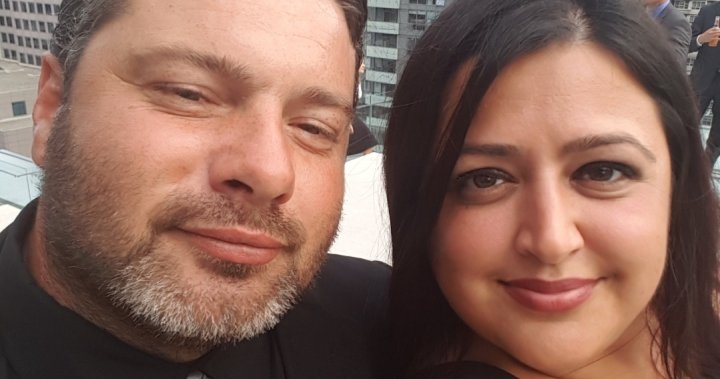Paulo, often known as “Paul,” was just 39 years old when he passed away from cancer, leaving his beloved wife Jessica Soares of Beeton, Ontario, heartbroken.
His battle lasted 31 months, she added, including two craniotomies, 53 rounds of radiation treatment, and 18 months of chemotherapy.
It all began on an ordinary Sunday afternoon—a long and challenging journey.
“It happened fast. There was no prior notice. We were in our home. He gave me a glance.
He was unable to talk, so when I noticed him beginning to sway to one side, I simply picked him up and moved him onto the couch. After that, we had to make an urgent trip to the Royal Victoria Hospital in Barrie, Soares remembered.
She was surprised to find that Paul had brain cancer and that there was a “nine centimetre lump on his left frontal lobe.”
That would be the first of a string of surprises.
He was recuperating, therefore he wasn’t working. I was with him, working on my own without any advantages.
And we discovered that his chemotherapy wasn’t paid for,” she added.
As his caretaker, Soares didn’t tell Paul much about her struggle to get Paul access to vital life-extending care. She wanted him to focus on getting well while she petitioned his insurance to help cover the cost of the drug.
“At one point, I actually put our house up for sale to pay for his medical care… I would have done anything at that time to keep him alive. The house meant little to me because I knew that we had our entire lives ahead of us. He was sincere in every way, she stated.
While Soares was able to get Paul coverage for the medication “via a specific benefit,” she was shocked to discover that chemotherapy was not commonly covered by provincial insurance.
The cost of his initial 30 days of care would have been $20,000. The cost of maintenance chemotherapy would have ranged from $2,500 to $3,000 per month after that, even though there are only five days in a cycle’s total of 28.
“In the case of a glioblastoma, the outlook is 15 to 18 months… if they are not receiving treatment, they won’t be able to spend that period with a reasonable quality of life, according to Marc Peeters, head of Brain Cancer Canada.
Peeters and Soares, who currently acts as an ambassador for the national organisation, are urging Canada to treat brain cancer fairly.
“Patients in Canada do not currently have equal access to chemotherapy. Whether you have access or not and whether you are covered depends on where you are and which province you are in, according to Peeters.
Brain Cancer Canada conducted a survey and found the drug Temozolomide is not universally covered by the provincial system “in Ontario and Nova Scotia and Newfoundland and Labrador and in Prince Edward Island. ”
This implies that patients in such provinces must rely on their private insurance, which they may or may not receive full coverage from.
They depend on various pharmaceutical programmes that might subsidise it for them if they don’t have access to private insurance or aren’t covered by it, said Peeters.
While paying out of pocket would put some Canadians in financial disaster, not being able to obtain the medication at all would mean missing valuable time.
“The treatment is so expensive.
We’re talking about tens of thousands of dollars, and most individuals can’t afford that out of pocket and handle it without suffering any repercussions, he added.
Since her husband passed away, Soares has made it her mission to promote discussion about the necessity of provincial funding for oral chemotherapy, which is used to treat brain tumours.
“At first, it was intended as a tribute to his desire to always leave things better than he found them.
I discovered some meaning and purpose through that and the grieving process, Soares continued, adding, “I want to make this different for someone else. I am powerless to undo what occurred to us. But I’ll do all I can to make life a little bit simpler for someone else if I can.
A brain cancer survivor demands equal access to chemotherapy in Canada.

